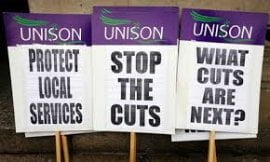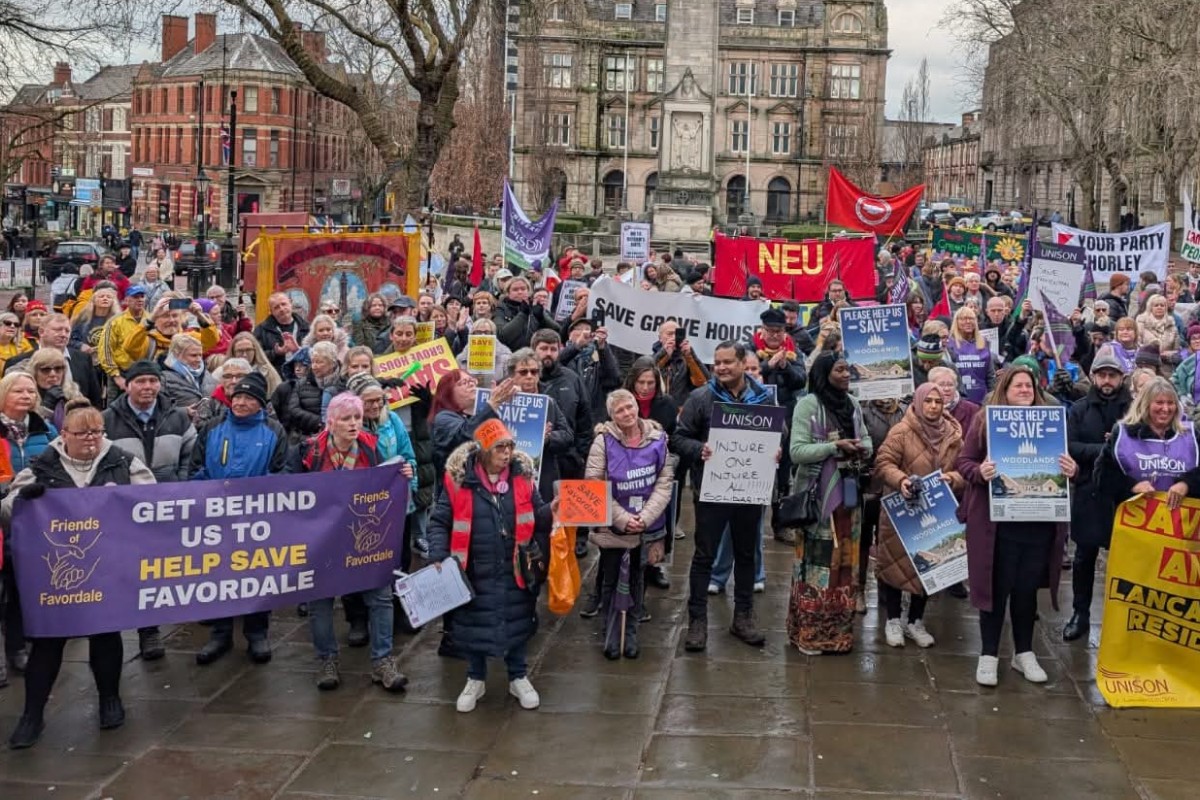This year UNISON’s Local Government Conference, meeting in Brighton, is followed immediately by National Delegate Conference. This should represent a perfect platform to reach out to hundreds of thousands of members and show a lead in the struggle against low pay and austerity.
This year UNISON’s Local Government Conference meets in Brighton, followed immediately by National Delegate Conference. Each year conference records in graphic detail the crisis in local government, the remorseless grind of austerity, zero hours contracts, commissioning, cuts in staff, massive rises in workloads and the pressure and stress affecting members – pressure which is concentrated on the lowest paid, frontline usually women, workers. This year however conference meets during a campaign for a Yes vote for strike action over pay. This should represent a perfect platform to reach out to hundreds of thousands of members and show a lead in the struggle against low pay and austerity.
On the frontline
It is hard not to feel incensed at the attacks on local government workers who have been hammered over the past six years since the crisis began. Worse than that, as the people who work face to face with the public, UNISON members have been at the sharp end of the attacks on welfare and the general social impact of the economic crisis too. Social workers, housing officers, youth workers, children’s centre staff, and support staff in schools have been through the mill. Services have been stretched to breaking point. Shortly after last year’s conference the Children’s Commissioner for England argued that changes in welfare regulations would force 500,000 children into poverty. That will have further consequences. Meanwhile adult social care is being squeezed with the impact being borne by low paid workers whose terms and conditions have been driven into the ground in many areas.
For many of the lay activists at conference life is a battle – defending members and trying to stop the barrage of attacks on services. In schools in particular UNISON members are seen as the most dispensable when budgets are to be cut, always backed up of course by Michael Gove’s elitist fanaticism. It is precisely in these conditions where the power of the union is most needed. Yet, throughout the whole of the crisis one thing has been missing: a clear lead from the national leadership and an industrial strategy. The reason is clear: the leadership have no perspective for real change and little confidence in the members.
The mood below the surface
Yet despite all of the problems, all of the austerity and the constant attrition at a local level, when the union did give a lead in mobilising for the November 29th pension strike in 2011, for instance, the members responded in their millions. This illustrates the real mood that exists below the surface. It is the same pressure from below that pushed the leadership into organising for this year’s pay claim. That pressure was very evident in the debate over the pay strategy at last years’ conference. Now it has been manifested in the big majority in favour of a strike ballot over pay this year.
Just a few weeks ago UNISON’s Health Conference pay was central to the discussions. As we reported at the time:
“Example after example was given of the effects on low pay. NHS staff in the Cameron’s constituency cannot afford to live in Oxfordshire and are going to food banks to survive. A delegate told of how as a single parent he received a phone call from his 12-year-old daughter stating there is no food in the house, only later to be ashamed when his daughter found out about his “Wonga” pay day loan. He finished his contribution with “the reality is I can’t afford to strike, but then I can’t afford not to strike”.
Fighting lead needed to defeat austerity
These events reflect the inevitable response from members after six years of austerity and years of pay freeze. There is only so far that people can be pushed without fighting back. Enough is enough! We’ve lost 20% of our real wages over the last few years. Low pay and instability are the curse of the public sector, and all this to bail out the bankers and the City of London. We have little choice but to struggle for a decent pay rise this year, although it will be a hard battle. The Con-Dem Coalition is seeking to take back every reform won by working people over decades; the only way to turn the tide is through militant industrial action. Linked to other unions and other public services, there is no reason why we can’t defeat the austerity.
As conference is taking place during the ballot process, it should act as a springboard to campaign for the maximum vote in favour of strike action. The evidence from November 29th was that well organised branch campaigns, meetings with members in every office, depot and school can help build a head of steam. At the same time also, maximising the turnout and the vote in favour of strike action will put the national leadership under pressure to deliver. The pay demand of £1 per hour is clear and unequivocal in local government and it is also a demand that strikes a chord with low paid workers.
Ultimately however, the experience of these last few years is that UNISON needs a fighting socialist leadership. The experience of the labour government was that the UNISON leaders sought more often than not to hold the line and seek to compromise with the government, often at the cost of the members. More recently however, the Tories “shock and awe” policy put the leadership on the back foot and placed huge pressures on the members. Now that the members are ready to fight, we have a tremendous opportunity to stop the further slide in wages and living standards; but the best guarantee of that is to build a democratic and fighting UNISON.






